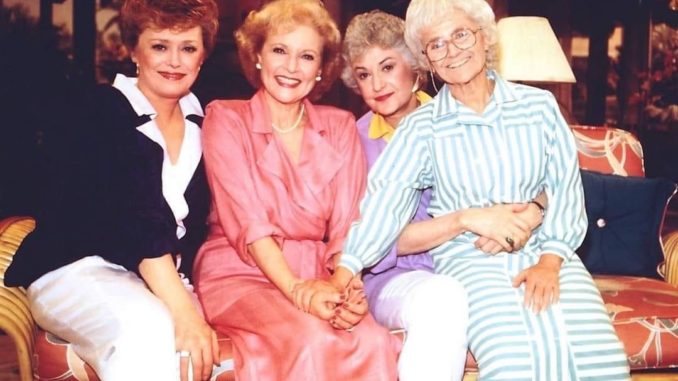
The show gave us a reason to look forward to growing older
My first memories of The Golden Girls are probably pretty similar to a lot of other ’90s kids: I’d be at my Granny’s house on a “sick day” and she’d insist we pause our thousandth viewing of The Wizard of Oz to catch the quartet of silver-haired women sling sass all over the place. The acerbic jokes went right over my head, and I couldn’t keep up with much of the episodic plots, but what I do remember is that the show was mandatory, drop-everything viewing, and it changed my entire understanding of what the twilight years could look like.
Contrary to what I’d imagined of my grandmother’s days when I wasn’t around, these women — Sophia (Estelle Getty), Dorothy (Bea Arthur), Blanche (Rue McClanahan), and Rose (Betty White) — weren’t sitting around cross-stitching pillows and waiting for the littles to come by so they could spend all day making peanut butter toast and playing Yahtzee. They had their own identities, desires, and priorities that had nothing to do with earning a World’s Greatest Grandma mug. By the time we met them in the series’ pilot, Dorothy and Rose were living in Blanche’s cozy Miami home after responding to an ad, three strangers who’d become a family in their golden years, and Sophia moved in after her retirement home burned down.
These women refused to be beholden to any kind of “three widows and a divorcée” titling; the Golden Girls prided themselves on their individual skills and personalities. Sophia was harsh and hilarious, loved to cook, and had a lifetime of stories to tell about the old country. Dorothy, Sophia’s daughter, was a schoolteacher who commanded a room with her booming voice, smarts, and sense of moral authority. Blanche was a former debutante who embraced her sexuality and didn’t abide by any societal suggestions that she was too old to do so. And Rose, sweet Rose, was a ball of sunshine — albeit a wacky one, sometimes — who helped others cope with their grief. The fact that they even had kids or grandkids — save for the unique relationship between Sophia and Dorothy, of course — was mostly treated like an afterthought. What mattered was that they were still in the company of those they loved and they were being true to their own passions. That they were getting up there in age didn’t stop them from enjoying themselves or each other.
Whether that meant eating midnight cheesecake, throwing on slinky nightgowns to entertain a barrage of bedroom suitors, or just telling wild stories about St. Olaf, these ladies needed no one’s permission to do the things they loved with the people they’d chosen to spend their final days with. What was a somewhat unusual character set then now feels like a promise. Even if you spend your youth raising children, they’ll eventually fly the coop, and you might outlive your spouse, if you even had one. But what’s left doesn’t have to be loneliness. There’s still a “you” in the future ahead. These women weren’t devoting their time to moping about the loss of husbands or their empty nests; they seized the opportunities they had to pursue their own interests and surround themselves with friends who were funny, compassionate, sometimes even bitter, and, best of all, honest about their ups and downs.

In college, my girlfriends and I used to joke that we were going to go full-on Golden Girls when we were older because we had the same sense of agency and fellowship these four women had, and being together again seemed like the perfect way to spend those final years, even as we were nearing our own marriages and new families. Ours wasn’t a rejection of the idea that we’d end up with familial responsibilities and difficult healthcare needs; it was a dismissal of the notion that we couldn’t still have fun and a heaping sense of self-worth after committing to the nuclear family structure for however long that might last, just like these TV characters.
The Golden Girls taught us that our silver years could be a blast, just like the times we had in the dorms — only with a bit more financial security and room to stretch our legs (and probably a lot less booze and dancing). We would still get to make tawdry jokes and show off our skills in the kitchen like Sophia. We could still prioritize our careers and intelligence above our looks like Dorothy. We could still be body-positive and excitable like Blanche, who decidedly did not conform to the prevailing Hollywood notion that ladies of a certain age couldn’t be portrayed as desirable or sexually active. And we could still be goofy and good-humored like Rose.
There are a lot of reasons why The Golden Girls doesn’t always hold up upon modern review — several jokes built on racist stereotypes, rape culture, and slut-shaming come to mind — but the show still resonates for its central premise, which is that we are still just women, regardless of age, and to that end, maybe we’re the best each other can hope for. The show gave us a reason to look forward to, rather than dread, that part of life and, better yet, to imagine going through it with our pals and confidantes.
The Golden Girls is available to stream on Hulu. Check out more great ’80s series to watch here.
